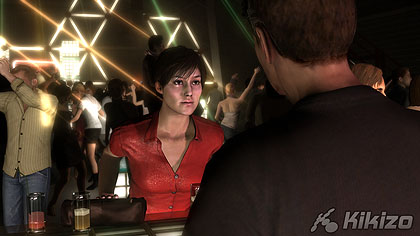Heavy Rain: David Cage Interview
Quantic Dream founder spills beans on QTEs, Project Natal versus PS3 motion control, "primitive" emotions in gaming and a private tête-a-tête with Hideo Kojima.
Page 2
Kikizo: The first demo you showcased felt quite solitary, but the new Madison Paige episode is obviously much more public. How are you managing the balance between private and public situations in the story?
Cage: There are many scenes that are quite crowded. We go from one scene to another, each scene is different. Some people like Jayden are involved with the police, he works with the police. Other characters aren't.
Kikizo: How many people will we encounter in these crowd scenes, max?
Cage: The scene in the night club is really crowded, maybe 200 people on screen dancing.
Kikizo: Could you go into more detail about the technology powering Heavy Rain? I thought it was one of the best-looking games of last year...
Cage: Thank you.
Kikizo: It's always interesting to hear how these things are accomplished.
Cage: Well all the technology is proprietary, developed by Quantic Dream. We've worked for quite a while on PlayStation 3 - we got some alpha kits, dev kits for PS3 a long time ago, maybe before other developers. And also we worked with the full cooperation of Sony, they gave us fantastic support. And we really wanted to develop specific technologies because we were interested in more specific topics, like how the skin reacts to light, how to animate eyes, how light reflects in eyes, how to integrate body motion capture and facial motion capture, how to have a crowd - many, many topics which are not necessarily useful for other types of games, but we have some very specific needs in this one, especially with directing - the way we play with the camera, the way the camera slightly shakes all the time, etc, etc.
Kikizo: One of the big questions in this industry, of course, is how to create emotional experiences. You've played a headline role in that particular debate.
Cage: I've always thought the only real next gen feature would be emotion. I didn't believe that physics, AI, or polygons, or texture maps would be a real next gen feature, OK - it's just about technology. But technology is just a tool, it's not the content. It's the tool to create the content. You know when we talk about emotion in this industry, I don't think we're always talking about the same thing. Because the some people believe that when you get a golfer smiling because he succeeded, this is emotion. Well I believe this is a very primitive emotion.
We've got a lot of emotions in our industry - we've got frustration, competition, anger, adrenaline. But I'm much more interested in more sophisticated emotions like empathy, sadness, happiness, and the ways to trigger them. And this is really difficult to be honest with you, it's a real challenge. There are many ways to achieve this goal. The one we chose is to use narrative and actors.











 Satoru Iwata Video Interview - the late Nintendo president spoke with Kikizo in 2004 as 'Nintendo Revolution' loomed.
Satoru Iwata Video Interview - the late Nintendo president spoke with Kikizo in 2004 as 'Nintendo Revolution' loomed. Kaz Hirai Video Interview - the first of Kikizo's interviews with the man who went on to become global head of Sony.
Kaz Hirai Video Interview - the first of Kikizo's interviews with the man who went on to become global head of Sony. Ed Fries Video Interview - one of Xbox's founders discusses an epic journey from Excel to Xbox.
Ed Fries Video Interview - one of Xbox's founders discusses an epic journey from Excel to Xbox. Yu Suzuki, the Kikizo Interview - we spend time with one of gaming's most revered creators.
Yu Suzuki, the Kikizo Interview - we spend time with one of gaming's most revered creators. Tetris - The Making of an Icon: Alexey Pajitnov and Henk Rogers reveal the fascinating story behind Tetris
Tetris - The Making of an Icon: Alexey Pajitnov and Henk Rogers reveal the fascinating story behind Tetris Rare founders, Chris and Tim Stamper - their only interview? Genuinely 'rare' sit down with founders of the legendary studio.
Rare founders, Chris and Tim Stamper - their only interview? Genuinely 'rare' sit down with founders of the legendary studio. The History of First-Person Shooters - a retrospective, from Maze War to Modern Warfare
The History of First-Person Shooters - a retrospective, from Maze War to Modern Warfare